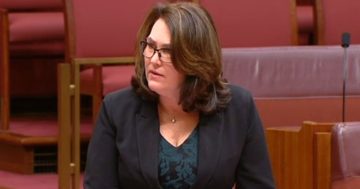
The PwC scandal has seen a number of senior staff fall on their swords. Photo: David Murtagh.
The cross-party parliamentary committee examining the behaviour of PricewaterhouseCoopers has strongly condemned the firm for leaking confidential Treasury information, but it will not release the names of those involved.
The interim report into the management and assurance of integrity by consulting services from the Senate Finance and Public Administration References Committee is scathing of PwC’s “calculated breach of trust” in leaking tax information to the financial benefit of the company and its multinational clients.
While a PwC partner advising the government on tax matters in 2016, Peter-John Collins allegedly revealed confidential Treasury information to executives throughout the accountancy firm and to its international clients, devising a scheme to help them avoid paying the taxes he was helping to establish.
Mr Collins has since left the company and was last year deregistered by the Tax Practitioners Board after the leak was revealed.
The ongoing fallout has seen other senior PwC officials, including its chief executive officer Tom Seymour, fall on their swords.
The matter is now the subject of a police investigation.
PwC gave the Senate a list of 63 names of people sending and receiving emails about the Treasury information, and while the committee has been highly critical of the firm, it has stopped short of releasing those names publicly.
The reason, the committee says, is because it believes some people named might not have been significantly involved.
The committee has recommended that PwC cooperate fully with ongoing investigations and provide more details about those involved in the matter.
“PwC did not provide the committee with any indication of the extent to which each of the 63 named individuals were involved in the breach of confidentiality and the plan to monetise that information,” the report states.
“In that regard, PwC did not give the committee any basis on which to determine the involvement or otherwise of the people on the list.
“The committee expresses its displeasure at PwC for placing the committee in such an invidious position … The committee considers the onus is on PwC to promptly publish accurate information about the involvement of PwC partners and personnel in the interest of the transparency and accountability it claims to be working towards.”
On the breach of trust itself, the committee’s report could hardly be more critical of PwC’s behaviour.
“Mr Peter Collins and certain other PwC partners had no regard for their obligation to maintain the confidentiality of Treasury consultations and information,” the report states.
“Equally, their desire to aggressively monetise confidential Commonwealth information demonstrates no regard for the public interest and the efforts of the then government to prevent multinationals from using complex and artificial structures to escape paying their fair share of tax in Australia.
“It is clear that the desire for personal gain trumped any obligations that PwC had to the Commonwealth of Australia and its citizens.
“This was a calculated breach of trust by PwC.
“While Mr Collins is a central figure in these events, it is evident from the internal PwC emails brought to light through Senate Estimates that his actions were understood to be problematic for PwC if ever made public, and yet were supported and condoned within PwC.
“There is no evidence that PwC colleagues or leaders called out this behaviour for years, up until it became publicly known in 2023.
“Indeed, PwC subsequently sought to protect its reputation by effectively stonewalling the Australian Tax Office in its pursuit of documentation related to the misuse of confidential information by Mr Collins and other PwC partners.”
It comes as a new national survey shows a vast majority of Australians believe the giant consultancy firm should be banned from future government work.
The Australia Institute’s survey of 1,002 Australians over four days in early June found that 79 per cent of respondents believed PwC should not get any new government contracts, while almost half (45 per cent) think the ban should be permanent.



















